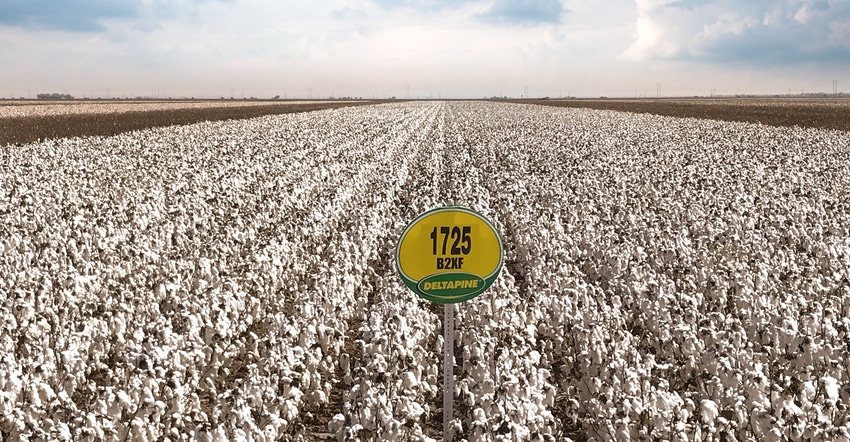September 7, 2017

Sponsored Content
Strong cotton yields reported in Texas have growers excited about the harvest season.
In the Rio Grande Valley near Harlingen, Levi Burns began harvesting on his 2,800 acres in late June and could tell by the number of modules he was picking that the yield was going to be outstanding this season. Most of his fields are furrow-irrigated, but he also has a couple of dryland fields, and yields have been good all around, he said.
“Last year, I grew DP 1725 B2XF in my Deltapine® New Product Evaluator (NPE) plot, and the yield and fiber quality were tremendous,” Burns said on a rainy day in mid-August. “I actually won an award for yield with it. This season, it’s winning an award in our fields. The fiber quality is very good, lint turnout has been 42 and 43 percent, and the yield has been tremendous, with some fields picking 4.25 bales per acre and others going over 4.5 bales per acre on 38-inch rows.”
Burns said he thought 4.5 bales per acre with DP 1725 B2XF would be a record for his farm until two days later when he was back in the harvester picking a 52-acre field of DP 1646 B2XF, where he dropped 62.5 modules.
“To have a field that size average 5.1 bales per acre is definitely a record for me,” he said. “It’s the best cotton I’ve ever grown. There are many growers down here who did not plant Deltapine this season, but my guess is many of them will plant these two varieties big time in 2018.”
The fiber grades have been good on the modules of both varieties he had ginned as of August 15. On 252 bales of DP 1646 B2XF from a dryland field, the grades averaged 36.3 staple length, 2.5 leaf, 4.4 micronaire and 28.7 strength, and they went into the loan at 53.49 cents. He has netted 70 cents on the bales sold so far.
“I am very excited about cotton harvest this season,” he said.
Nick and Stanley Joe Pinkston of Sinton, Texas finished picking their cotton on August 10, then began custom harvesting on other farms in the Coastal Bend. They are seeing good yields on dryland fields.
“DP 1725 B2XF picked like a dream on our dryland fields,” said Nick Pinkston. “As the commercial check, it was the best yielder in our NPE plots, averaging nearly 3 bales per acre. It appears to be a bit loose in the bur, so I will not plant my whole farm to it in 2018, but will plant it again.”
Pinkston said he would plant the majority of his farm next season to DP 1646 B2XF, which also delivered top-end yields and outstanding fiber quality for the second year in a row. He has bales of DP 1646 B2XF coming back from the gin at 4 and 5 cents above loan price, he said.
“We picked dryland fields averaging from a little more than 2 bales per acre to nearly 3 bales per acre,” he said. “That’s real good cotton. We’ve never made these kind of cotton yields down here like this before. I think the bar has been set much higher with Deltapine varieties.”
Check in throughout the harvest season for more Deltapine results in your area at Deltapine.com/yield.
# # #
ALWAYS READ AND FOLLOW DIRECTIONS FOR USE ON PESTICIDE LABELING. IT IS A VIOLATION OF FEDERAL AND STATE LAW to use any pesticide product other than in accordance with its labeling. NOT ALL formulations of dicamba or glyphosate are approved for in-crop use with cotton with XtendFlex® technology. ONLY USE FORMULATIONS THAT ARE SPECIFICALLY LABELED FOR SUCH USES AND APPROVED FOR SUCH USE IN THE STATE OF APPLICATION. May not be approved in all states. Contact the U.S. EPA and your state pesticide regulatory agency with any questions about the approval status of dicamba herbicide products for in-crop use with cotton with XtendFlex® technology.
Cotton with XtendFlex® technology contains genes that confer tolerance to glyphosate, dicamba and glufosinate. Glyphosate will kill crops that are not tolerant to glyphosate. Dicamba will kill crops that are not tolerant to dicamba. Glufosinate will kill crops that are not tolerant to glufosinate. Contact your Monsanto dealer or refer to Monsanto’s Technology Use Guide for recommended weed control programs.
Monsanto Company is a member of Excellence Through Stewardship® (ETS). Monsanto products are commercialized in accordance with ETS Product Launch Stewardship Guidance, and in compliance with Monsanto’s Policy for Commercialization of Biotechnology-Derived Plant Products in Commodity Crops. Only commercialized products have been approved for import into key export markets with functioning regulatory systems. Any crop or material produced from this product can only be exported to, or used, processed or sold in countries where all necessary regulatory approvals have been granted. It is a violation of national and international law to move material containing biotech traits across boundaries into nations where import is not permitted. Growers should talk to their grain handler or product purchaser to confirm their buying position for this product.
B.t. products may not yet be registered in all states. Check with your Monsanto representative for the registration status in your state.
Individual results may vary, and performance may vary from location to location and from year to year. This result may not be an indicator of results you may obtain as local growing, soil and weather conditions may vary. Growers should evaluate data from multiple locations and years whenever possible.
Always read and follow IRM, where applicable, grain marketing and all other stewardship practices and pesticide label directions. Respect the Refuge and Cotton Design®, and XtendFlex® are trademarks of Monsanto Technology LLC. Deltapine® is a registered trademark of Monsanto Company. LibertyLink® and the Water Droplet Design® is a registered trademark of Bayer. All other trademarks are the property of their respective owners. ©2017 Monsanto Company.
About the Author(s)
You May Also Like




